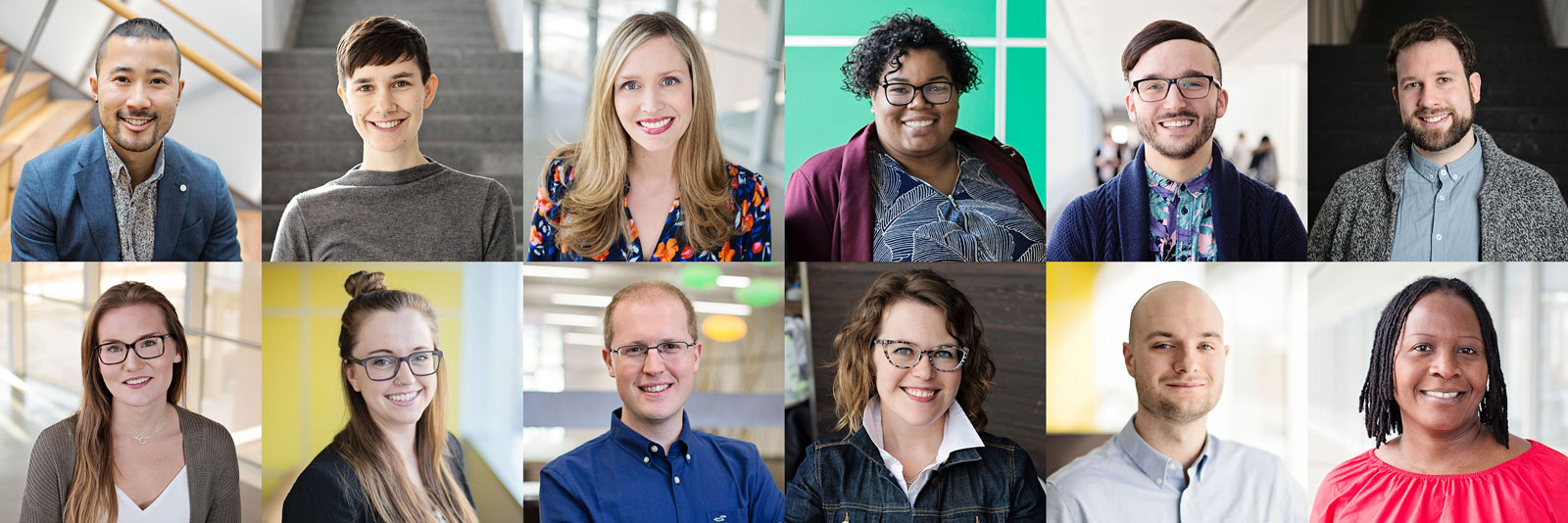
From left to right, top to bottom: Ryan Au (MPH student), Brynn Day (MPH student), Karyn Gibbons (staff), Lauren Lindsey (MSc student), Sammy Lowe (MSc student), Misha Miazga-Rodriguez (MPH student), Brittney Molner (MSc student), Heather Nixdorf (MSc student), Michael Paulden (faculty), Erin Pollock (staff, committee chair), Trenton Smith (staff) and Dunsi Strohschein (alumni).
A culture of diversity and inclusion in an organization helps foster and support an environment where all members feel accepted and valued. This can result in higher retention rates and increased engagement and contributions from its members, which ultimately leads to the organization reaching its fullest potential.
At the School of Public Health, placing an emphasis on diversity and inclusion seems like a no-brainer.
"Diversity, equity and inclusion are all underlying social determinants of health," explains Erin Pollock, chair, Diversity and Inclusion Action Group (DIAG). "At the School, this is what we embody. It's what we teach our students, and what our faculty members, researchers and staff do. It's important that our internal culture match our external work."
Karyn Gibbons, former co-chair of DIAG adds, "Diversity, inclusion and respect are all part of the values of the School of Public Health, so by virtue of that, formalizing this group was important. Now, the University of Alberta has launched its Equity, Diversity and Inclusion (EDI) Strategic Plan, encouraging faculties and organizational units to show commitment to EDI. Having already established this group puts us ahead of the game."
DIAG was approved as a formalized group by Faculty Council in 2014-making it one of the first of its kind at the University of Alberta. After completing a diversity climate survey and offering several workshops that allowed for feedback, the group created an action plan to address common issues raised by the School community over the years.
"As a School, we should be purposeful in creating the environment we want to be a part of," says Shanthi Johnson, dean, School of Public Health. "We want to be a diverse community that engages with one another-across differences-in thoughtful conversation and uses those differences to strengthen us. DIAG has helped enriched our community and strengthened dialogue surrounding EDI."
Providing valuable insight to the School community
DIAG provides an opportunity for all members of the School community to better understand what diversity and inclusion is, how it relates to School culture and what role we all play in it.
"We want people to see themselves here. We also want to provide opportunities for people to gain insights on aspects of diversity and inclusion in Canada," says Pollock.
An example of this would be DIAG's commitment to host an Indigenous education session every year, like the KAIROS Blanket Exercise.
"International students and scholars, and even Canadians, may not have the background or education to understand the settler relationship to Indigenous people," explains Pollock. "Indigenous health and wellness should be tenets of the work we do, so it is important we create an opportunity for people to learn and gain a deeper understanding."
In addition to offering educational opportunities, DIAG serves as a valuable resource for many groups, units and leaders in the School through the following ways:
- organizing and hosting workshops and learning opportunities for the School community
- working closely with the School of Public Health Students' Association to address concerns about respect and overall school culture
- providing advice to individuals, groups and units organizing events or initiatives to ensure economic, physical and social barriers are addressed and considered when planning
- representing the School at Pride events, Orange Shirt Day, Pink Shirt Day, etc.
- hosting Indigenous education sessions once per year
- triaging requests, concerns or issues to University of Alberta services
- presenting a Diversity Champion Award annually to a member of the School community who demonstrates outstanding contributions to creating a culture of diversity and inclusion within the School
"Our intent is to raise the profile of diversity and inclusion in everything the School does," says Pollock.
"The work DIAG is doing continues to build on the strengths of our School and our deep commitment to make diversity and inclusion part of our School's fabric," says Johnson. "Every day I am encouraged by the conversations and actions that are happening in the School that earnestly address EDI."
A valuable volunteer experience
Currently, DIAG has 12 members, but they are always looking for more. The group welcomes new representatives from all stakeholder groups in the School: students, staff, postdoctoral fellows and faculty members. Unlike many working groups, DIAG does not have a maximum number of members and welcomes anyone who wants to be part of the group.
"We are not all Boeing 737s. We're not all the same, we don't operate the same way and we can't all fly using the same manual," explains Pollock. "The more people we can get around a table with different experiences and perspectives the better the voices are, and the more complete the work can be."
Both Gibbons and Pollock agree that being part of any working group or committee in the School is a great learning experience. It provides insight as to how the organization works and how decisions are reached, and it provides the unique opportunity to get to know different people from other stakeholder groups.
"Sitting on this group has been a great learning opportunity for me and has allowed me to identify the amount of privilege I have," says Gibbons.
"I am a white, CIS-gender woman and a settler, so I'm always trying to learn every day how to be a better ally. Diversity really enriches all of our lives, but without inclusion it is useless. Diversity and inclusion expert Verna Myers says that 'Diversity is being invited to the party, while inclusion is being asked to dance.' You can't have one without the other."